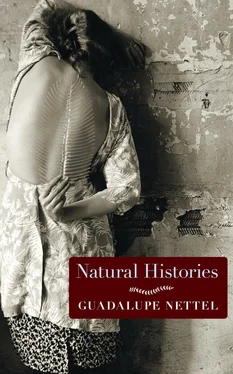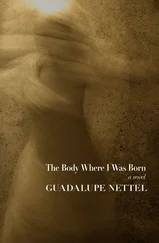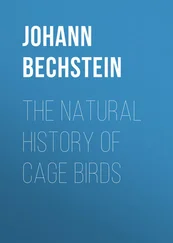From then on Greta was in the habit of always lying in my lap, as if instinctively trying to cover with her body the absence of the baby I used to carry in my womb. It repulsed me. Her purr agitated me, and I’d push her off. But my cat, undeterred, would come lie on me again after a few minutes. It was Marisa who took over my correspondence with Princeton. Had it not been for her, I wouldn’t have been accepted, let alone granted a scholarship. More than a thesis advisor or friend, she acted like a mother toward me.
Shortly after that Greta brought into the world six perfectly healthy kittens. I didn’t get to witness the birth; I didn’t even hear it. It happened early one morning, as I slept with the help of some sleeping pills my advisor had given me. When I woke up I felt a kind of bustling around beneath my sheets and I saw that they’d been born not in the drawer I had so lovingly prepared for them, but in my bed, in the space between my legs. That awed me no end. What kind of reality do animals conceive of, or at least, what kind of reality did my cat conceive of where I was concerned? It’s obvious that her gesture was not happenstance but of her own choosing, if it is that cats, unlike we humans, do make certain decisions. The newborns made high-pitched noises, like birds shrieking; they squirmed about constantly, attached to their mother who lay there stretched out before them, allowing the six to feed from her nipples. It was Greta, much more than those barely formed creatures, who awoke in me an immense tenderness. Her surrender to her kittens’ sucking was total, and at the same time, she could not have looked more exultant. I spent a moment in silence with her, watching her in her role as proud mother, as if, rather than an instinct, her manner and her attentiveness spoke to a sacrifice, its results now visible.
I carefully got out of bed, and as I was making breakfast, I realized that for the first time in two weeks I didn’t want not to exist. I called Marisa after to tell her the good news. When I went back into the bedroom, neither Greta nor her kittens were on the bed. I imagined her carrying them one by one by their necks to the dresser drawer, where Milton, responsible I suppose for fathering the litter, had also made himself comfortable. Everything seemed to be in its place. In those days the only thing that brought me any real joy was seeing Greta with her children. When she wasn’t nursing them she was cleaning them with her tongue, licking them day and night, one at a time, with admirable dedication. If she left them a moment alone in the drawer, it was to eat or to use the litter box. The rest of the time she dwelled in absolute and blissful devotion.
Little by little I regained my enthusiasm for my studies and for my upcoming trip. That year I didn’t go on some beach vacation. Instead I focused on preparing for the professional exam and packing all of my belongings into boxes. Cautiously at first, so as not to disturb the young family. Then more boldly as it got closer to my due date. Knowing what Milton and Greta meant to me, Marisa offered to take them. And when Greta’s brood was old enough, she’d find them good homes. She had a huge house with a garden, and promised me they’d be no trouble.
“Just the opposite. They’ll fill the void from your leaving.”
I knew the cats couldn’t be in better hands. But still, I promised her it would just be for a little while as I got settled in Princeton.
The day of the professional exam came and I was confident as I took it. My grades were as high as we’d expected. I told my landlady I’d be leaving the apartment. Once all my books were boxed up I started to pack my bags and either store or give away the clothing I wasn’t bringing. People came and went from my apartment, buying or taking things, loaded down with bags of books or cookware. The move was taking over the apartment with an increasingly frenetic rhythm, like a phenomenon with a will of its own. Greta’s kittens ran all over the place, climbing on the boxes, the stacks of books, and the living room furniture. The only thing that remained in its place was the dresser drawer, soft and cozy, like the last bastion of an epoch coming to a close, in which I often wanted to hide. In there, where the eight of them slept increasingly cramped together, nobody seemed fazed by the change. But it only seemed that way. Marisa and I had decided that she’d come for the cats two days before I left and one day before the moving truck came for the furniture. I don’t really remember if we’d spoken in her office or on the phone. But one thing is for certain; the cats understood.
The evening before, when I came home after an exhausting day of higher-education bureaucracy, I noticed that the cats weren’t there. I searched the whole apartment for them and I looked for a way they could have escaped from it. The only thing I was able to determine was that the balcony door was open. I cannot describe the grief I felt. We hadn’t even had the chance to say goodbye. “Cats do decide,” I remember thinking. I felt like a fool for not having realized it.
When I was a little girl my mother had a fungus on one of her toenails. On her left pinkie toe to be exact. From the moment she discovered it she tried everything to get rid of it. Every morning she’d step out of the shower and with the help of a tiny brush pour over her toe a capful of iodine whose smell and sepia, almost reddish tone I remember well. She saw to no avail several dermatologists, including the most prestigious and expensive in the city, who repeated the same diagnoses and suggested the same futile treatments, from traditional clotrimazole ointments to apple cider vinegar. The most radical among them even prescribed her a moderate dose of cortisone, which only inflamed my mother’s yellowed toe. Despite her efforts to banish it, the fungus remained there for years until a Chinese doctor to whom nobody — not even my mother — gives credit, was able to drive it away in a few days. It happened so unexpectedly that I could not help wondering if the parasite itself hadn’t decided to move on to another place.
Until that moment fungi had always been — at least for me — curious mushrooms that appeared in children’s book illustrations and that I associated with the forest and elves. In any case, nothing to do with that rugosity that gave my mother’s toenail the texture of an oyster shell. However, more than the dubious and shifting appearance, more than its tenacity and attachment to the invaded toe, what I remember best about the whole affair was the disgust and repulsion the parasite inspired in my mother. I have seen other people over the years with mycosis on different parts of their body. All kinds of mycoses, from those that cause the bottom of the foot to dry out and peel to the circular red fungi you often see on chefs’ hands. Most people bear them with resignation, some with stoicism, others with genuine disregard. My mother on the other hand suffered the presence of her fungus as if it were a mortifying affliction. Terrified by the thought that it might spread to the rest of her foot, or worse, her entire body, she separated the affected toenail with a thick piece of cotton to keep it from rubbing against the adjacent toe. She never wore sandals and avoided taking off her socks in front of anyone she wasn’t very close to. If for some reason she had to use a public shower she always wore plastic slippers, and to swim in a pool she’d take off her shoes right at the edge just before diving in, so that nobody would see her feet. And so much the better; if anyone had found out about that toe and all the treatments it had been through, they would have thought that instead of a simple fungus, what my mother had was the beginning of leprosy.
Читать дальше












